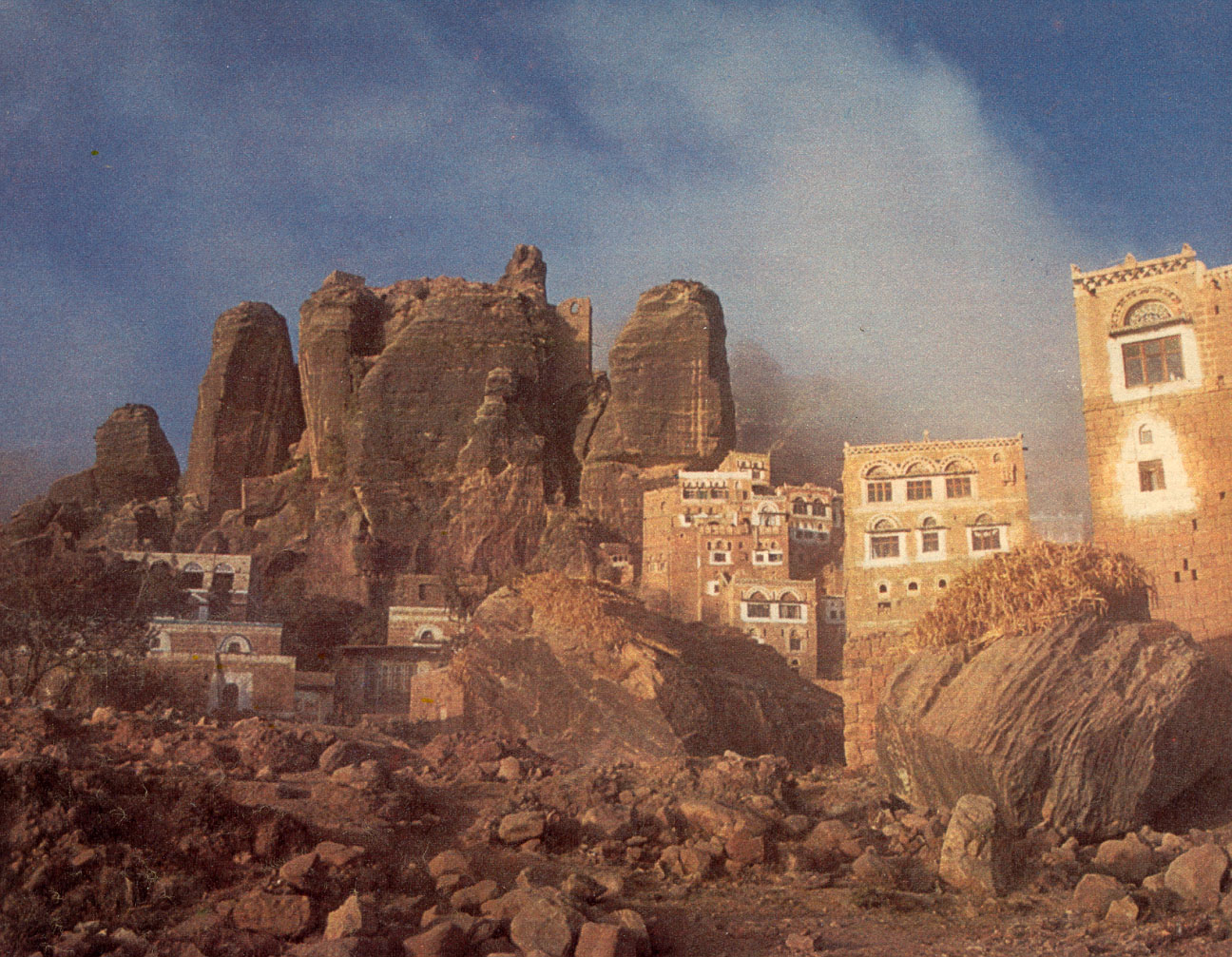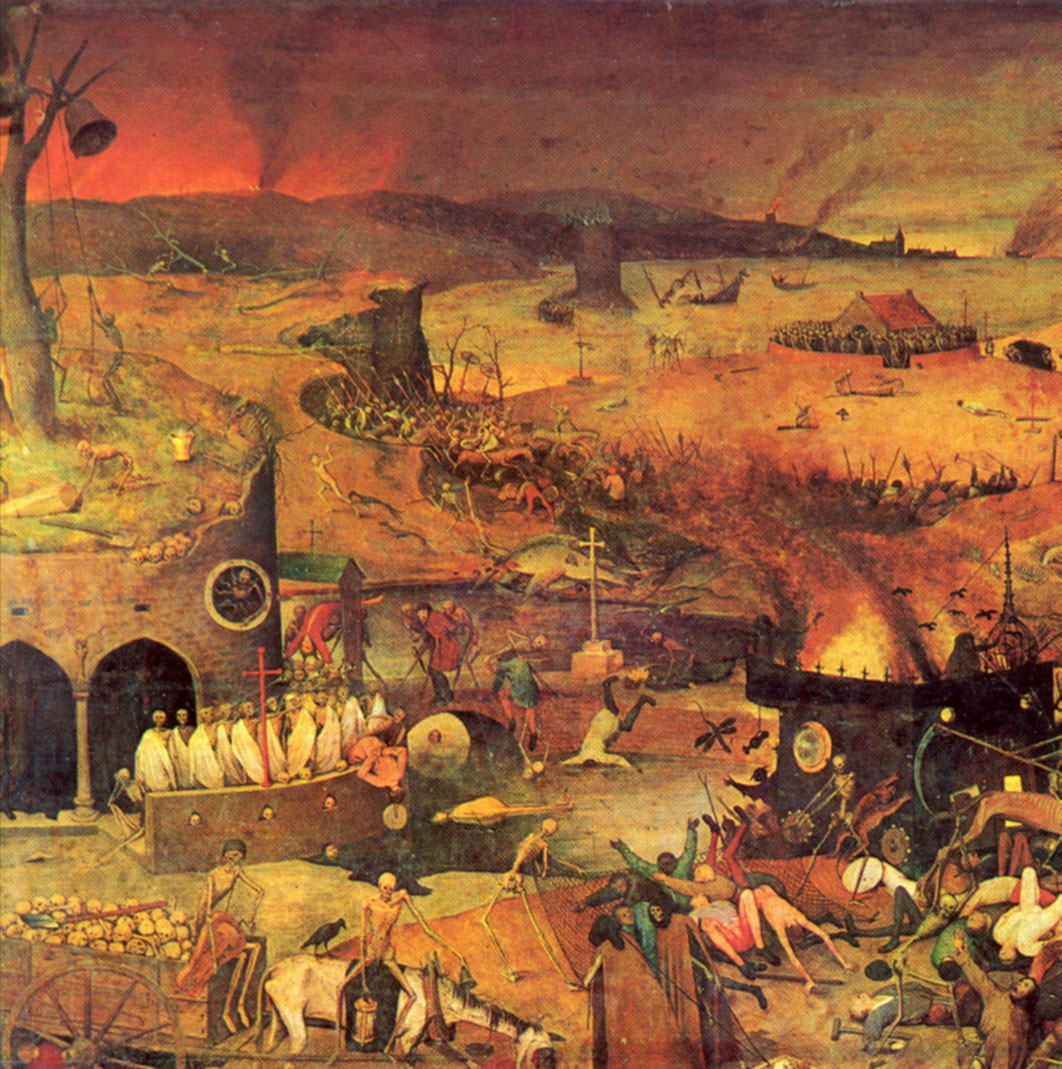
It’s a long shot. Hills seen through a 1000mm lens. A black truck moves towards the camera silhouetted against a white dustcloud. Parallel shadows mark the faint progress of a road. There is no sky. Just a hazy blue wall of ridges and shadowed sides. Two bands of grey cut across the middle ground. Dust rises in dry air. Flecks of scrub in a random monotony. Grass that looks long dead spreading a brittle finger across the foreground.
 Behind me, delicately laced between huge crags and boulders, lies the Holy Village. Dark glazed windows framed in whitewash. Arches of carved stone. Tiles of blue, white, turquoise and indian red. Each building stands flat-faced to the sun, and to the distant blue wall. There is no attempt at a street plan. Each building rises serenely oblivious to its neighbours. A tree the colour of stone spreads its dim shadow over scattered rocks. There is no other vegetation.
Behind me, delicately laced between huge crags and boulders, lies the Holy Village. Dark glazed windows framed in whitewash. Arches of carved stone. Tiles of blue, white, turquoise and indian red. Each building stands flat-faced to the sun, and to the distant blue wall. There is no attempt at a street plan. Each building rises serenely oblivious to its neighbours. A tree the colour of stone spreads its dim shadow over scattered rocks. There is no other vegetation.
*
The truck grows like a tiny blot of ink on a huge sheet of hand-made paper. The cloud behind hardly moves. There is no sound.
 Elsewhere, at some other time, a bloated corpse floats on a pool both dark and silvery. A huge bell hangs from a leafless tree. A black tower burns.
Elsewhere, at some other time, a bloated corpse floats on a pool both dark and silvery. A huge bell hangs from a leafless tree. A black tower burns.
Two men talk: one tall, gaunt, gothic; the other squat, heavy, baroque.
“Come on, make your move. You can’t sit like a toad forever. The bell swings ever harder against the sky. It’s as black as your arse over there. Get going. Lift your blubber. There must be somewhere you can go?”
“If you say so.”
“Just twitch your stumps. It’s always hard, the first stirring of the limbs, but then it’s nothing, a numb pursuit. One limb, then another. One, two. Left, right. Over and over again.”
“I’m sure.”
“It’s not as if you can’t. We’ve cut this country from ear to ear with our jaunts. One after another. A few miles, then rest. A few more, then food. And so on. Nothing to it. There’s never been this doubt. This questioning.”
“But for us there’s no escape. Here we are, figures in a landscape. One Brueghel picture after another. Hunters in the Snow. Adoration of the Magi. Triumph of Death. Each one different, but the frame’s always the same!”
“What’s that got to do with it? We’re all in someone’s bloody picture. Brueghel’s as good as any. Look around – the colour’s right. It’s no great effort to see the king on his butt arguing the toss with the soldiers of doom. Surely you can imagine the alternatives? It could be Piero the Perfect, or Watteau the Whimsical, or, God save us, Goya the Grotesque. What’s got to you with Brueghel. The old sod’s got to have someone bake his bread, dance a jig or play cat and mouse with a rabid dog.”
“But why us?”
“Why not! What does it matter? It could be different, we could be somewhere else (we probably are). But for now we’re here. Up to our chins in this contrivance. A necessary colour on an unnecessary canvas.”
*
The road is straight. The truck only rises and dips with the undulations of the terrain. It never turns – to left or right. On it goes towards the strange village with its boulders the size of a house and its houses empty as the sky.
And at the centre the leafless tree. A shabby nameless species that seems neither to live nor to die.
*
“Throw the dice. Hit the deck. Let’s see what the day will bring.”
“More of the same. More and more. All the same.”
“But what of the sudden run of sixes? The streak of threes? It’s not always a familiar pattern. At times there appears the grace of luck, the spasm of winning. What of that you toad?”
*
Under the tree, where once there must have been shade, a man sits on a rock. Sun bothers him as much as it does the rock. He watches the dark smudge that is a truck and the cloud of light that is dust. Despite the intense heat his pale shirt is covered with an old tweed jacket. On his knee like a burning stain rests a page torn from a book of Flemish painting.
It is a habit to sit on the same rock under the same threadbare tree. The painting on his knee is there by choice, but chosen so long ago it becomes as predictable as the rock, as ridiculous as the tree.
*
I’ve been here most of the year for longer than I can recall. A month or two back home and then here again. It’s OK. Quiet. Not always as hot as this. Everyone’s inside most of the day. But in the evening there’s a crowd here, under this tree, talking, singing, drinking, telling each other of other times.
All change is a repetition. You know, one year’s like another. Each turn brings us back to where we were. OK, it’s disguised. The colour’s remixed. A line or two may be altered. The characters might move from here to there, but it’s nothing new. When I used to write I could sit here with a card table and cover sheet after sheet with scrawl. I’d go in later and read it through. It all seemed fresh, up and down maybe, but fresh. Now I can see it running on and on. One piece blurring into another. Sometimes short. Sometimes long. Seen from here or seen from there.
My mother and father were keen gardeners. We moved a lot. House to house, country to country. Rangoon, Addis Ababa, Cairo, Delhi. And each time, each new place, they’d set to work. Survey the garden, or the jungle, wasteland, baked mud, whatever it was – and then order stuff from wherever. Letters to friends, relatives, nurseries back home. They used to dig most of it themselves. The servants were outraged, thought it indecent or corrupt. But there was no argument. The ground was dug, beds laid, seed sown, plants bought, water piped in and within a season or two a garden emerged. It always seemed quite natural. I never questioned it. They never discussed it. But now, looking back, it seems quite bizarre. Each garden in such exotic and varied places was largely the same. Just as the house, whatever its size, shape or circumstance ended up pretty much a repeat of its predecessor. As if my parents were carrying out the wishes of someone else. Each house and garden another realisation of the same grand plan.
I sit here now under this tree, which to me could be any tree, and gaze at the blue hills across the plain. A truck moves up and down on its way towards us. A cloud of dust hangs in permanent suspension, cocooning the truck in light. It moves but it gets no nearer.
*
And this picture on my knee – an image that has been with me a long time. It’s a Brueghel. It hardly matters which one. The desolate homeliness of cottages and burning towers. A huge bell hanging from a leafless tree. Crows saying so much in their black-hearted silence. A bloated corpse floating on a pool. And figures. So many. So much energy, moving everywhere at once. Endless wandering, yet so little sign of purpose or order. A curious metaphysical shambles – as if suddenly they’d lost their bearings and all the familiar apparatus of their villages grew strange and unintelligible.
*
And I always come back to these two: the gaunt one and his fat sidekick. Two disgruntled peasants locked by Brueghel in an endless conversation.
Surrounded by such aimless misery what do they talk about? Perhaps they imagine escaping to a paradise of purpose in which everything has its place? Or maybe they ponder on the mysteries of fate, or the inevitability of never dying?
Foolish as it may seem I never grow tired of wondering what it is they manage to talk about for so long?
Note
This work was started, as far as I can remember, at the beginning of the 1980’s. The two desert photographs came from a magazine, now lost. The painting is a poor quality reproduction from a French publication, Chefs-D’Oeuvre De L’Art, Grands Peintres: Bruegel, Hachette-Fabri, 1969 – it shows a small section of Brueghel’s Triumph of Death, 1562, in the Prado, Madrid.
The narrative developed out of two lines of reverie that somehow seemed intertwined: one, imagining what it might be like to overhear two figures conversing in a Brueghel painting; and the other, wondering what it would be like to be in the desert landscape of the photographs.
The figures in Brueghel’s world argue about their inability to determine their own fate. The character sitting under the desert tree reflects on the characters in the Brueghel image resting on his knee. While Brueghel’s reluctant subjects feel like prisoners in a world in which every action is determined by someone else, the desert stranger can see only miserable peasants desperate for a sense of purpose in an indeterminate and aimless world.
From our exalted position we can smile at both points of view. Maybe someone in turn sits watching us, perhaps seeing purpose in our purposelessness or chaos in our order.
© John Danvers. January 2003. Limited edition.